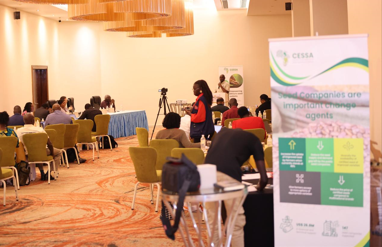Pan African Agricultural Development Agency (AGRA), in partnership with the Food and Agriculture Organization (FAO) of the United Nations, on Monday launched a US$580,000 program dubbed “Support towards improved seed sector performance and competitiveness in South Sudan.”
The program will focus on transforming the country’s seed system through a comprehensive national seed system assessment, capacity building for seed production and distribution, quality assurance, policy and legal reforms, and stakeholder engagement.
Funded by the Royal Norwegian Embassy in South Sudan, the initiative, which will be guided by AGRA’s Seed Systems Assessment Tool (SeedSAT), encompassed within the AGRA Center of Excellence for Seed Systems in Africa (CESSA) framework, marks a pivotal moment in the country’s agricultural transformation journey.
The launch event served as both an inception meeting and a platform to socialize AGRA’s SeedSAT diagnostic tool, which will assess the current state of South Sudan’s seed systems by identifying gaps and designing tailored and targeted recommendations to inform a costed national seed investment plan. AGRA has successfully carried out SeedSAT in 12 SSA countries.
Speaking at the launch event, which brought together key stakeholders from government, development agencies, seed companies, and youth groups, Prof. Mathew Gordon Udo, Undersecretary, Ministry of Agriculture and Food Security, termed the initiative as “timely and transformative”.
“This project aligns with our national goals to ensure food and nutrition security, create jobs, and empower our youth,” he said.
AGRA’s Director for Seed Systems, Dr. Jane Ininda, emphasized the importance of coordinated efforts.
“Seed systems are the backbone of agricultural transformation,” she said. “Through SeedSAT, we are not just diagnosing gaps, we are co-creating solutions with national stakeholders to build resilient, inclusive systems that serve farmers better.”
For her part, Christianne Nyakato Kivy, Programme Officer Development Cooperation in the Royal Norwegian Embassy, said the launch marks a significant step toward building a resilient and competitive seed system in South Sudan.
This workshop will unite stakeholders to lay the foundation for a sustainable agricultural future, empowering farmers with the tools they need to thrive,” she added.
AGRA’s seed sector development work in South Sudan dates back to 2011. This earlier phase led to the release of 37 resilient crop varieties, training of 12 plant breeders, and support for 10 seed companies producing over 1,700 metric tonnes of seed annually. These efforts laid the foundation for the country’s first commercialization of maize hybrids, significantly boosting yields for smallholder farmers.
The newly launched SeedSAT initiative marks a strategic leap toward transforming South Sudan’s predominantly informal seed system into a formal, self-sustaining ecosystem that reliably serves the needs of its farmers. At the heart of this transition is a multifaceted program designed to strengthen the supply of climate-smart and nutrient-dense crop varieties, thereby improving food and nutrition security across the country.
“Availability and access to high-quality, locally adapted crop seeds are critical to increasing agricultural production and productivity, laying the foundation for improved food security, nutrition, and livelihoods,” said Meshack Malo, FAO South Sudan Country Representative. “The Support Towards Improved Seed Sector Performance and Competitiveness in South Sudan initiative aims to empower farmers, their organizations, the private sector, and other key stakeholders to strengthen the seed value chain and drive sustainable growth in the agriculture sector.”
The initiative will seek to be inclusive by ensuring stakeholder mapping and alignment, training of thematic leads and consultants on the SeedSAT process, and engagement with the Seed Traders Association of South Sudan (STASS) on strategies for capacity building among breeders, seed companies, and youth groups, with a strong emphasis on commercialization and sustainability.
In parallel, the initiative seeks to enhance overall seed sector performance by fostering competitiveness and institutional support, especially in areas of production, certification, and distribution. Recognizing the critical role of early generation seed (EGS), the program will scale its production and increase the availability of certified seed varieties to meet the rising demand for quality seed among smallholder farmers and the market demand.
Central to this vision is the commitment to youth empowerment. Through targeted training and integration into seed value chains, the project aims to generate meaningful employment opportunities for young people in agriculture. At the policy level, SeedSAT will support the ongoing review and validation of the Seed and Plant Variety Bill, helping to shape a more enabling regulatory framework for seed sector growth.
To guide these efforts, SeedSAT will deploy a robust diagnostic tool that assesses functionality across eight thematic pillars of a seed system: from breeding, variety release, and maintenance to quality assurance, farmer awareness, market distribution, and the broader policy and planning environment.
Established in 2006, AGRA is an African-led and Africa-based institution dedicated to placing smallholder farmers at the core of the continent’s burgeoning economy. AGRA’s mission is to transform agriculture from a mere struggle for survival into a thriving business.




